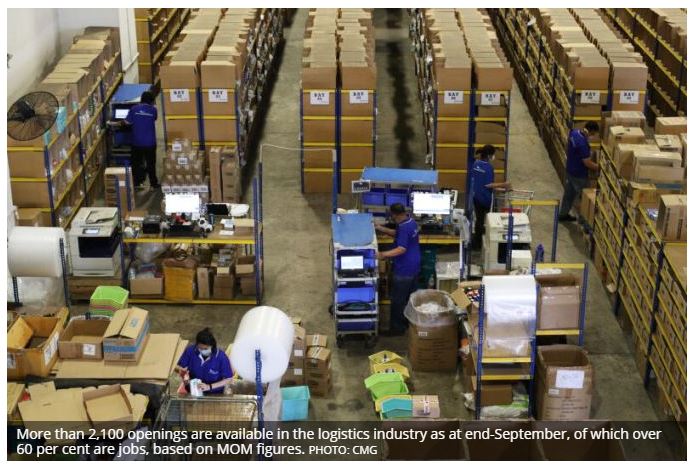Over 2,100 openings in Singapore logistics industry; 1,500 new jobs to be created
MORE than 2,100 openings are available in the logistics industry as at end-September, of which over 60 per cent are jobs, based on figures from Singapore’s Ministry of Manpower’s (MOM) latest weekly jobs situation report released on Tuesday.
Of these jobs, the majority (64 per cent) are in non-PMET (professional, manager, executive and technician) roles such as transport clerks, material handlers, transport specialists and freight coordinators.
The remaining jobs are in PMET roles such as regional sales managers, logistics managers, logistics system or solution specialists and e-commerce executives.
Salaries for the jobs range from S$1,600 to S$7,250 depending on the specific role and candidate’s fit.
Manpower Minister Josephine Teo on Tuesday noted that the logistics industry is “one of the most open and welcoming of people who are transiting from other occupations from other industries”, and the “ease of entry is quite good”.
Between April and September, 710 individuals were placed into jobs, company-hosted traineeships and training openings in the industry.
In the same period, more than 250 mid-career individuals have also made the switch to logistics through Workforce Singapore’s (WSG) career conversion programmes.
Over the next five years, large logistics companies in Singapore are planning to create 1,500 new jobs in the industry, said Minister for Trade and Industry Chan Chun Sing on Tuesday. This is based on the Economic Development Board’s existing pipeline of committed investments secured between 2018 and 2019.
In addition, investments in digital transformation will bring about new capabilities and jobs in the areas of digitalisation, automation, data analysis and data management within the logistics sector.
Both Mr Chan and Ms Teo were speaking to the media at a virtual press conference during a visit to DB Schenker’s Red Lion facility.
Ms Teo noted that the effects of the Covid-19 pandemic were unevenly felt within the logistics industry – sectors such as aviation, aerospace and hospitality were more adversely affected while companies servicing the e-commerce, pharmaceutical and healthcare sectors saw an increase in activities and operational requirements.
Thus, to support the industry’s manpower needs, WSG worked with logistics companies that had hiring demand to take in workers from the hard-hit sectors, on a secondment basis through the SGUnited Jobs Initiative.
As a result, between April and September, 380 workers from 16 companies in sectors including aerospace, aviation and hospitality were able to stay employed through the arrangement. For instance, DB Schenker brought in 21 logistics assistants on secondment from Razor Solutions.
Mr Chan said he sees the logistics industry as “one of the bright sparks in (Singapore’s) economic path, going forward”.
He added that this is a result of the Republic’s reliability of policies, resilience of networks and efficiencies across companies’ operations as well as port and network operations.
Mr Chan said Singapore will continue to strengthen its hub status through three key areas: ensuring that global players continue to “plant their investments” and grow their operations here; strengthening the country’s network of free-trade agreements to provide more opportunities and more competitive prices; and improving the efficiency of systems and employing the latest technology to turn over the logistics industry at a much faster rate.
Source: https://www.businesstimes.com.sg/government-economy/over-2100-openings-in-singapore-logistics-industry-1500-new-jobs-to-be-created


 English
English




